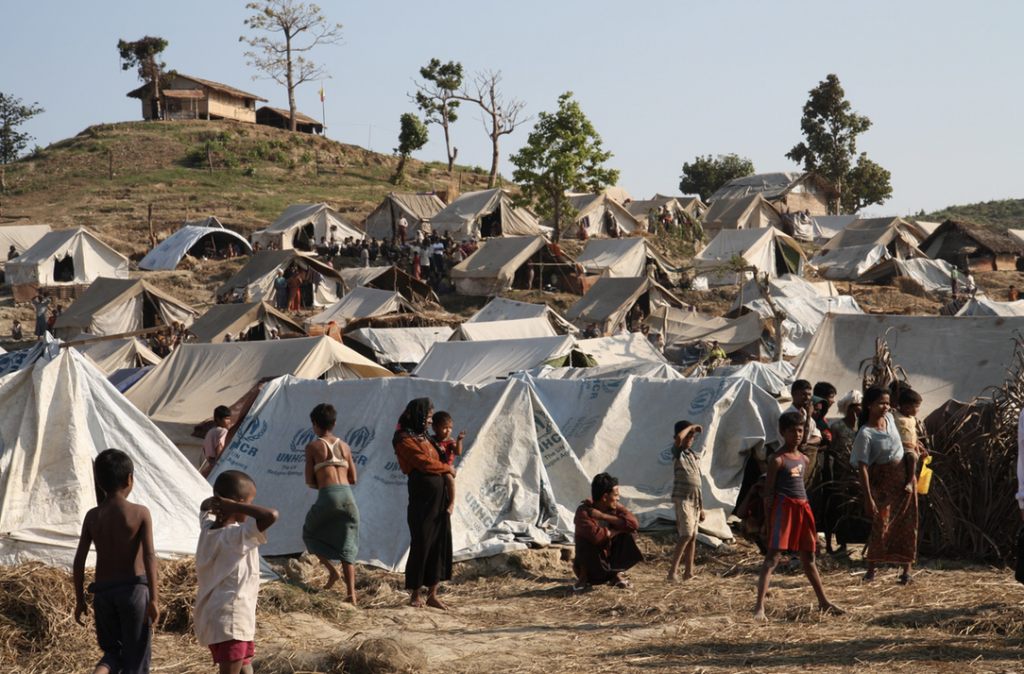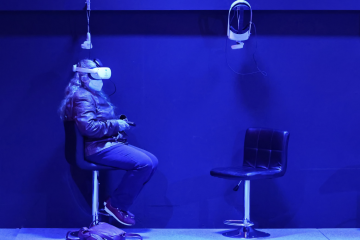
A Dire Beginning
On August 31st, 2017, the lifeless husks of 9 women and 10 Rohingya refugees washed ashore the sands of Cox’s Bazar, Bangladesh.1 Under dictatorial rule of the Myanmar army between 1962 and 2011, the Rohingya people of the Rakhine State have been handed a predicament of institutionalized oppression on the grounds of religious and ethnic discrimination. While these acts of terror are often justified by the supposed targeting of extremist subsets within the population, the scale and scope of these acts can only be regarded as a “textbook example of ethnic cleansing,” says United Nations High Commissioner for Human Rights, Zeid Ra’ad Al Hussein. 2
Barriers to Justice
The crisis in Myanmar is one of ethnic disavowal of the Rohingya people who, despite having lived in the nation for generations, are “not among the 135 officially recognized ethnic groups and so are denied citizenship,” reports Yimou Lee.3 A Burmese blogger who wishes to remain anonymous defends that “many Rohingya also support joining radical Islam[ic] groups” and that “[the] Rohingya will never integrate with locals.”4 However, military mistreatment of the diaspora predates widespread Islamic radicalism since the Rohingya were denied citizenship or independence in 1948 when Myanmar achieved independence from the British.5 Moreover, an independent Fact-Finding Mission chartered by the UN Human Rights Council found that the military “tortured and otherwise ill-treated Rohingya women and girls, including with rape and other forms of sexual violence; laid landmines; and burned hundreds of Rohingya villages.”6 Military justification of these acts of terror as self-defense is negated by their indifference to those they target.
Though the world looks to the newfound democratic face of Myanmar, Aug San Suu Kyi, her views have been obscured by over a decade of living under house arrest for her liberals views under the previous dictatorship7 and by the need to maintain popular support in fear of losing power to the military. The alternatives to what the Chinese ambassador of Myanmar has described as “just an internal affair”8 is to either relinquish control over the fate of the Rohingya to the military, or to look to global actors for aid.
While the UN has attempted to dispatch “dignity kits” and called for the “end of violence and for the restrictions on humanitarian aid to be lifted,” they have been met by nothing but resistance on behalf of the Myanmar military. Be it by intercepting foreign aid packages or barring UN Special Rapporteur from entering the country, foreign aid seems limited in its ability to help.9
The Dangers Abroad
With over 700, 000 Rohingya refugees displaced from their homes, the world’s nations are looking to each other for the provision of asylum. CBC reports that there has been a 60% increase in hate crimes against Muslims in Canada.10 With growing islamophobia and with democratic governments increasingly depending on public support, the predominantly Muslim asylum seekers face difficult challenges.
In 2017, Germany authorities reported 995 politically charged attacks on refugee shelters.11 A study conducted by the Leibniz Centre for European Economic Research found that asylum seekers were “ten times more likely to be attacked in former East Germany than they were in the former West.”12 The researchers found that “the increase in hate crime is also linked to xenophobic attitudes that had already existed in the respective regions and which now seem to have become entrenched.”13 The rise of islamophobia brings up important questions of refugee safety once they have been granted asylum. Even if the Rohingya are granted asylum, can the government truly ensure their safety with the proliferation of xenophobic sentiments?
The Legitimization of Xenophobia
German Interior Minister Horst Seehofer recently stated that “Islam doesn’t belong to Germany.”14 A common sentiment amongst the Western right is that Islam has become synonymous with an unyielding extremist faith. While plans to integrate Muslim immigrants and citizens into society exist, such as French President Macron’s plan to increase Muslim representation in existing organizations and government, public sentiment seems to resist these efforts.15 According to Hanane Charrihi, the granddaughter of a victim of the Nice attack targeting Muslims, “tolerance does exist in France, but sometimes it seems those who are against tolerance shout the loudest and get the most airtime.”16 Be it a profiteering media platform or populist unrest at the influx of aliens, the “loudest” voice seems to be the one that pries most on fear. The rise of far-right populism has given way for such public statements that aim to stoke fear and invoke a mentality of otherness, especially following times of violence.17 Most recently, Australian Senator Fraser Anning attributed the Christchurch Attack to “the immigration program which allowed Muslim fanatics to migrate to New Zealand in the first place.”18 The normalization of these anti-Islamic sentiments into the public and political spheres has contributed tremendously to the rejection of Muslim asylum seekers such as the Rohingya.
Empathy from Afar
It is important to note that there is still undoubtable international support for the Rohingya people. Australia’s foreign affairs minister, Julie Bishop, has stated that Australia will provide up to $5 million in aid to the Rohingya people.19 Malaysia will be “deploying humanitarian aid to Bangladesh to help Rohingya refugees caught in Myanmar’s internal conflict.”20 Poland stated that aid is “desperately needed to address serious humanitarian needs, but also to begin to restore the confidence and hope that are essential to a restoration of peace and stability” reports the New York Times.21 While global support for the Rohingya is not contested, countless countries, including Poland, continue to refuse the acceptance of asylum seekers and immigrants from these predominantly Muslim countries.22 The current right-wing Polish government has explicitly stated that “Poland opposes the mandatory quota system for immigrants from North Africa and the Middle East.”23 In fact, the rise of anti-Islamic sentiment in right-wing political parties such as the Alternative for Germany or Holland’s Party of Freedom, which has proposed the ban of the holy book of Islam and led the polls in the 2017 elections,24 formalize the defamation of Muslims.
A Hopeful Conclusion
In this world of growing complexity, the Rohingya face much more than a bigoted military looking to uproot their existence from reality; they face an increasingly hateful world. They face governments who must appease their constituents fearing the uncertainty of a Muslim exodus, and other governments who wish to impose this fear to declare themselves as protectors against outsiders. The Rohingya face closed yet sympathetic doors, or doors opened by men and women armed with pitchforks and torches. The Rohingya face numerous challenges, but one challenge they should not have to face is an international community who has lost hope in trying to reach a better future.
Edited by Mariana Furneri
References:
1United Nations. “Bodies of 19 Rohingya Refugees Wash Ashore in Bangladesh.” Refworld. Accessed October 29, 2019. https://www.refworld.org/docid/5a94273da.html.
2United Nation. “UN Human Rights Chief Points to ‘Textbook Example of Ethnic Cleansing’ in Myanmar | UN News.” United Nations. United Nations, September 11, 2017. https://news.un.org/en/story/2017/09/564622-un-human-rights-chief-points-textbook-example-ethnic-cleansing-myanmar.
3Lee, Yimou. “U.N. Chief ‘Shocked’ by Top Myanmar General’s Comments on Rohingya.” Reuters. Thomson Reuters, March 27, 2018. https://www.reuters.com/article/us-myanmar-rohingya-un/u-n-chief-shocked-by-top-myanmar-generals-comments-on-rohingya-idUSKBN1H31VK.
4Isabelle. “Quick Summary of What’s Happening in Myanmar: Who Are The Rohingya? And More.” DominicanAbroad. Dominican Abroad, October 3, 2017. https://www.dominicanabroad.com/whats-going-on-in-myanmar-eil5/.
5Abdelkader, Engy. “The History of the Persecution of Myanmar’s Rohingya.” The Conversation. Rutgers University, September 20, 2017. http://theconversation.com/the-history-of-the-persecution-of-myanmars-rohingya-84040.
6“MYANMAR 2017/2018.” Amnesty International. Accessed October 29, 2019. https://www.amnesty.org/en/countries/asia-and-the-pacific/myanmar/report-myanmar/.
7Isabelle. “Quick Summary of What’s Happening in Myanmar: Who Are The Rohingya? And More.” DominicanAbroad. Dominican Abroad, October 3, 2017.
8Lee, Yimou. “U.N. Chief ‘Shocked’ by Top Myanmar General’s Comments on Rohingya.” Reuters. Thomson Reuters, March 27, 2018.
9“MYANMAR 2017/2018.” Amnesty International. Accessed October 29, 2019.
10Harris, Kathleen. “Anti-Muslim Crimes in Canada up 60%, StatsCan Reports | CBC News.” CBCnews. CBC/Radio Canada, June 13, 2017. https://www.cbc.ca/news/politics/hate-crimes-muslims-statscan-1.4158042.
11“Far-Right Violence against Refugees Persists in Germany.” DailySabah. www.dailysabah.com, December 25, 2017. https://www.dailysabah.com/europe/2017/12/26/far-right-violence-against-refugees-persists-in-germany.
12Lange, Martin. “ZEW Press Release: Hate Crimes Against Asylum Seekers Occur Predominantly in Regions with Little Immigration Experience.” zew.de. ZEW, February 25, 2019. https://www.zew.de/en/presse/pressearchiv/uebergriffe-auf-asylsuchende-treten-vor-allem-dort-auf-wo-es-wenig-erfahrung-mit-zuwanderung-gibt/.
13Lange, Martin. “ZEW Press Release: Hate Crimes Against Asylum Seekers Occur Predominantly in Regions with Little Immigration Experience.” zew.de. ZEW, February 25, 2019.
14Martin, Michelle. “Facing Far-Right Challenge, Minister Says Islam ‘Doesn’t Belong’ to Germany.” Reuters. Thomson Reuters, March 16, 2018. https://www.reuters.com/article/us-germany-politics-islam/islam-doesnt-belong-to-germany-new-interior-minister-says-idUSKCN1GS12V
15Piser, Karina. “A New Plan to Create an ‘Islam of France’.” The Atlantic. Atlantic Media Company, March 29, 2018. https://www.theatlantic.com/international/archive/2018/03/islam-france-macron/556604/.
16Chrisafis, Angelique. “’We Don’t Want You Here’: Muslims Fearful as France Prepares to Vote.” The Guardian. Guardian News and Media, May 5, 2017. https://www.theguardian.com/world/2017/may/05/france-muslims-fear-frustration-runoff-vote-marine-le-pen.
17“The Resistible Rise of the Far Right and Populism | Letters.” The Guardian. Guardian News and Media, November 22, 2018. https://www.theguardian.com/world/2018/nov/22/the-resistible-rise-of-the-far-right-and-populism.
18“Fury as Australian Senator Blames Christchurch Attack on Muslim Immigration.” The Guardian. Guardian News and Media, March 16, 2019. https://www.theguardian.com/world/2019/mar/15/australian-senator-fraser-anning-criticised-blaming-new-zealand-attack-on-muslim-immigration.
19“Australia Commits $5 Million to Rohingya Crisis.” SBS News, September 9, 2017. https://www.sbs.com.au/news/australia-commits-5-million-to-rohingya-crisis.
20Perimbanayagam, Kalbana, and Hana Naz Harun. “Malaysia to Launch Humanitarian Mission to Aid Rohingya Refugees via Bangladesh.” NST Online. New Straits Times, September 8, 2017. https://www.nst.com.my/news/nation/2017/09/277683/malaysia-launch-humanitarian-mission-aid-rohingya-refugees-bangladesh.
21Ives, Mike. “14 Countries Press Myanmar to Allow Aid in Rohingya Areas.” The New York Times. The New York Times, December 9, 2016. https://www.nytimes.com/2016/12/09/world/asia/myanmar-rohingya-crisis-rakhine-muslim.html.
22“Poland Refuses Middle Eastern Migrants.” euronews. EuroNews, January 2, 2018. https://www.euronews.com/2018/01/02/poland-refuses-mid-east-migrants.
23“Poland Refuses Middle Eastern Migrants.” euronews. EuroNews, January 2, 2018.
24“Dutch Freedom Party to Hold Prophet Mohammad Cartoon Contest.” Haaretz. Reuters, June 12, 2018. https://www.haaretz.com/world-news/europe/dutch-freedom-party-to-hold-prophet-mohammad-cartoon-contest-1.6172708.




